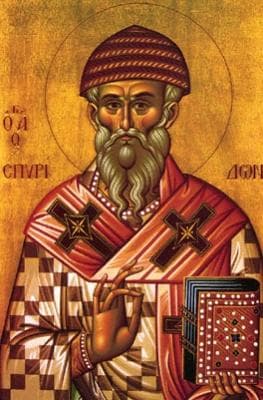Saint Spyridon of Cyprus
Saint
Feast Day: December 12
Biography
Saint Spyridon of Cyprus, also known as Spyridon of Corfu, Korfu, Kerkyra, Tremithus, Trimithon, the Wonder Worker, Thaumaturgos, Spiridion, and Spiridione, was a highly regarded saint in the Catholic Church. Born around the year 270 on the island of Cyprus, he displayed great piety from a young age. Growing up as a shepherd, he learned the values of patience, compassion, and caring for others. Spyridon married and had a daughter, both of whom later entered religious life. Following the example of his wife and daughter, Spyridon decided to become a monk and joined the monastery at Mount Carmel. His profound spirituality and devotion attracted the attention of the local community, leading to his appointment as the Bishop of Tremithus, Cyprus. As bishop, Saint Spyridon became a spiritual mentor to Saint Tryphillius of Leucosia, who later succeeded him as the Bishop of Tremithus. He tirelessly fought against the heresy of Arianism, which denied the divinity of Christ. His commitment to upholding orthodox Christianity made him a revered figure among the faithful. During the reign of Emperor Galerius, Christians endured a period of persecution. As a result of his steadfast faith, Saint Spyridon suffered greatly. His right eye was violently torn out, and his left calf was cut off. He was subsequently sent to forced labor in the Spanish mines, enduring immense hardships. However, with the promulgation of the Edict of Milan, which granted religious freedom to Christians, Spyridon was eventually released and allowed to return to his see. Saint Spyridon played an essential role in the early Church by participating in the Council of Nicaea and the Council of Sardica. At the Council of Nicaea in 325, he actively defended the orthodox doctrine of the Trinity, highlighting the unity and distinctiveness of the Father, the Son, and the Holy Spirit. His knowledge and wisdom had a significant impact on the deliberations and outcomes of these important Church councils. Throughout his life, Saint Spyridon performed various miracles, becoming renowned for his powerful intercession. According to legend, he once witnessed a gold ingot that was brought to him miraculously transform into a serpent when he ordered it to resume its true form. Additionally, he corrected a deacon who misused his gift of eloquence while reading Scripture, causing the deacon to develop a stammer. This experience helped the deacon recognize his error and redirected his focus back to the importance of the Word of God. One of the most famous miracles associated with Saint Spyridon occurred when he used a piece of pottery to explain the Christian concept of the Trinity. By illustrating how the three elements of earth, fire, and water combine to form pottery, he demonstrated the simultaneous unity and distinctiveness of the Father, Son, and Holy Spirit. During this demonstration, water flowed from the bottom of the shard while fire miraculously emerged from the top. This event led to him being revered as the patron saint of potters. Saint Spyridon passed away around the year 348, peacefully dying of natural causes. His incorrupt corpse, a sign of his sanctity, became an object of veneration and pilgrimage. He was canonized as a saint in the Pre-Congregation era, and his feast day is celebrated on December 12. Some calendars also observe his feast on December 14, while in Corfu, Greece, it is celebrated on August 11, honoring the transfer of his relics to the island. Saint Spyridon is a patron saint against floods, as well as potters and sailors. He is particularly revered in Corfu, Greece, and is also recognized as a patron in Kephalonia and Zakynthos, Greece. Overall, Saint Spyridon of Cyprus is remembered as a deeply spiritual and courageous bishop who defended orthodox Christianity and performed numerous miracles throughout his life. His teachings and intercessory power continue to inspire and guide Christians around the world.
